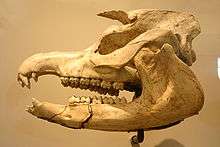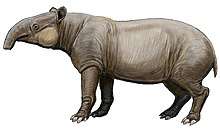Giant tapir
The giant tapir (Tapirus augustus)[3][4][5] is an extinct species of tapir that lived in southern China, with reports also suggesting it also lived in Java and Vietnam. Evidence suggests that the species first appeared in the Early Pleistocene and possibly survived until the early Holocene.[2][1] It was larger on average than modern tapirs, estimations range from 2.1 metres (6.9 ft) long and 0.9 metres (3.0 ft) tall at the shoulders to 3.5 metres (11 ft) long, and 1.5 metres (4.9 ft) metres tall at the shoulders. It may have weighed up to 500 kilograms (1,100 lb). The species was also placed in its own genus of Megatapirus, however, it is now conventionally placed within Tapirus.[3][1]
| Giant tapir | |
|---|---|
 | |
| fossil skull | |
| Scientific classification | |
| Kingdom: | Animalia |
| Phylum: | Chordata |
| Class: | Mammalia |
| Order: | Perissodactyla |
| Family: | Tapiridae |
| Genus: | Tapirus |
| Species: | T. augustus |
| Binomial name | |
| Tapirus augustus Matthew & Granger, 1923 | |
| Synonyms | |
| |

A restoration of Tapirus augustus
References
- "The biggest tapir". Tetrapod Zoology. Retrieved 2017-07-26.
- Haowen, Tong, Liu Jinyi, and Han Ligang. "On fossil remains of early Pleistocene tapir (Perissodactyla, Mammalia) from Fanchang, Anhui." Chinese Science Bulletin 47.7 (2002): 586-590.
- 1871-1930., Matthew, William Diller; 1872-1941., Granger, Walter; 1884-1960., Andrews, Roy Chapman; (1921-1930), Central Asiatic Expeditions (1923). "New fossil mammals from the Pliocene of Sze-chuan, China. Bulletin of the AMNH ; v. 48, article 17". hdl:2246/1308. Cite journal requires
|journal=(help)CS1 maint: numeric names: authors list (link) - Janis, Christine M.; Scott, Kathleen M.; Jacobs, Louis L. (1998-05-28). Evolution of Tertiary Mammals of North America: Volume 1, Terrestrial Carnivores, Ungulates, and Ungulate Like Mammals. Cambridge University Press. ISBN 9780521355193.
- "Fossilworks: Tapirus (Megatapirus) augustus". fossilworks.org. Retrieved 2017-07-18.
This article is issued from Wikipedia. The text is licensed under Creative Commons - Attribution - Sharealike. Additional terms may apply for the media files.